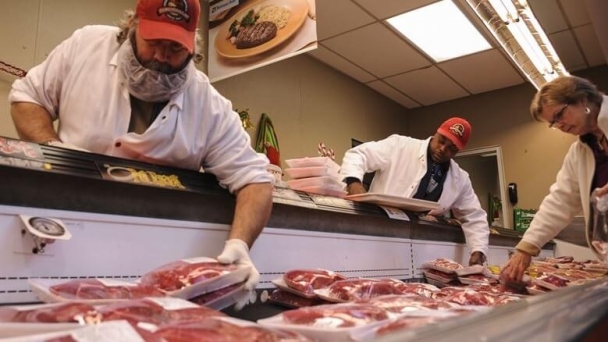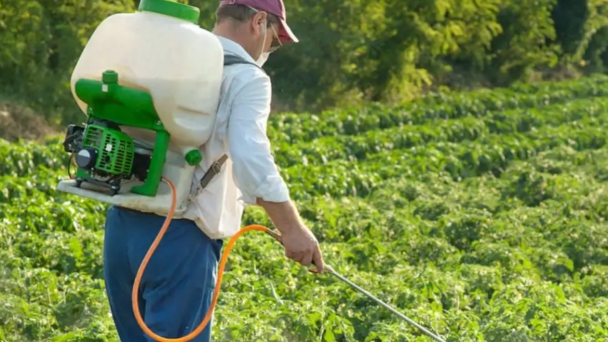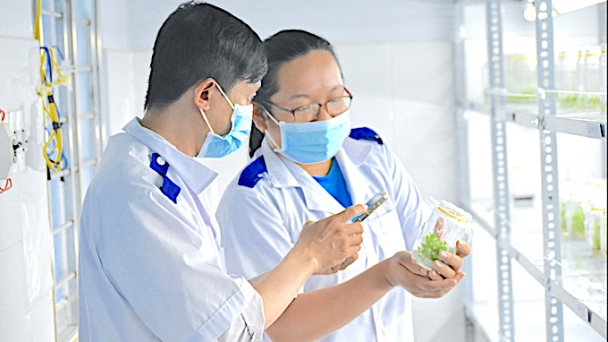January 2, 2025 | 23:02 GMT +7
January 2, 2025 | 23:02 GMT +7
Hotline: 0913.378.918
January 2, 2025 | 23:02 GMT +7
Hotline: 0913.378.918
In the stretch of a few weeks, Indiana farmer Kip Tom was hitting state fairs, farm shows and debates in late summer to talk about the rural economy, regulations and trade under the Biden-Harris administration.
Tom is a former U.S. ambassador to the United Nations Agencies for Food and Agriculture under former President Donald Trump. He's also coleader of the Farmers and Ranchers for Trump 47 coalition.
"I think Donald Trump is clearly the leader in making sure that we have a strong ag economy and making sure we can continue to export our excess production here in this country," Tom says.
TRUMP LEADS AMONG RURAL AMERICANS
Most rural residents agree with Tom's take as Trump carries a commanding level of support in the 2024 DTN/Progressive Farmer Pulse of Rural America poll. As many as 90% of poll respondents are farmers, ranchers or rural landowners.
The survey of 1,393 rural Americans shows nearly 70% say they support former President Donald Trump. Another 19% say they support Vice President Kamala Harris. There were 9% of rural residents who were undecided, and a wild card 2% say they back Robert F. Kennedy Jr., who has since ended his campaign and is supporting Trump.
The Pulse of Rural America poll shows Trump's backing among rural voters continues to strengthen.
David Trimner, who co-owns a 3,100-head dairy farm near Athens, Wisconsin, and also grows silage and forage crops, bought his farm with his family partner in 2016. Trimner noted he and his partner built the largest robotic milking barn in Wisconsin in 2019.
"When it comes to bigger issues like inflation, foreign affairs and stability overseas, I feel like a Trump presidency would be much more favorable," he says. "If we were to build that barn today, I would expect about a 40% increase in the cost to build it in just a few short years, which makes things much more difficult for us but then also the consumer, and they're the ones we rely on to buy our products."
When it comes to farming and ranching, 72% of rural Americans say agriculture is worse off now than four years ago, while just 8% say it is better off. Another 14% say everything is about the same, while nearly 6% are unsure.
Carolyn Durak, 85, and her husband, Mike, raise Angus-cross cattle in Hardin County, Tennessee. She expresses her love for her cows and the lifestyle of having a forest and open space, and has been pleased with calf prices in recent years.
"We happen to be getting some amazing prices for cows, which never happens," Durak explains. "We happen to be getting favored, which is kind of nice for a change."
Asked about the presidential race, Durak says she became much more encouraged when Harris stepped in for Biden on the presidential ticket.
"I'm so glad to have a sane person running that we can maybe save our country," she says.
THE ECONOMY AND INFLATION
Most rural Americans are worried about the nation's economy under Biden and Harris. A full 77% of poll respondents disagree or strongly disagree with the Biden administration's handling of the economy.
Just 24% of rural Americans rate the national rural economy as excellent or good. Another 60% view the rural economy as "not so good," and nearly 17% describe the rural economy as "bad."
Still, 11% of survey respondents report their personal finances are "excellent," and another 56% say their personal finances are "good." Another 30% of rural Americans indicate their finances are "not so good," while nearly 3% describe their personal finances as "bad."
Inflation has hit farmers in various ways. Brian Pedersen, a 27-year-old cattle producer and hay farmer near Franklin, Nebraska, says his finances "were a lot better under Trump." He points to interest rates on his operating loans that are more than double what they were four years ago.
"When I first started, when it was still under Trump, I was only paying 3.5% on an operating loan. It doesn't sound like much until you are talking about a couple hundred thousand dollars," Pedersen says. "That's a very big deal, and fuel prices are a lot higher when I buy diesel for the tractors and stuff to feed cows."
Not many rural residents expect a big turnaround next year. Just 15% of poll respondents say they expect to be "better off" than now. Just under 36% respond their financial situation will be "the same" next year, while nearly 29% say they expect to be "worse off." Another 21% say they are not sure what next year might hold.
Asked about some national issues, more than 43% point to the national debt and budget deficit as their biggest concerns.
"Someone is going to have to pay for that spending and debt," Trimner says. "And, generally, it's going to be taxes, and if it's not taxes, it's going to be, in a sense, printing money. And, that's when you get into inflationary trouble. As a farmer, we've all seen that."
Of the respondents, 17% are concerned about Chinese ownership of U.S. farmland, and nearly 12% are more concerned about Chinese ownership of agribusinesses. The U.S. agricultural trade deficit is the biggest concern for 15% of people surveyed. Access to global ag markets is the biggest concern for nearly 9% of rural Americans, while the war in Ukraine is the biggest issue for 4% of respondents.
Immigration policy and border enforcement under Biden also are concerns for producers. Though most of the people caught at the border are immediately deported, border crossings during Biden's time in office are more than four times higher than during Trump's.
"Whether you're conservative or liberal, I don't think anybody really likes that," says Rick DeGroote, a farmer near Parkersburg, Iowa. "I'm sure there are some, but that has ruffled a lot of feathers."
Another issue that has a lot of rural Americans shaking their heads is Biden's push for electric cars, or the "Green New Deal." Biden's team is spending a combined $13.5 billion to build electric charging stations and invest in battery manufacturing. Other policies such as emissions standards will force manufacturers to build more electric-powered cars and pickups.
"In rural America, everything is based on agriculture. When farmers do good, everybody does good," DeGroote says. "We depend on ethanol, and we depend on livestock."
INCREASED REGULATIONS, SAFETY NET WORRIES
Assuming that high input costs and low commodity prices are the biggest challenges for farmers, increased regulations also emerged as a top issue for 30% of survey respondents. This is followed by 26% citing concerns about "more extreme weather events." After that, 18% of those surveyed identify "a weak farm safety net" as their biggest challenge. The lack of affordable land came in next for 16% of poll respondents. Another 10% say their biggest challenge is the lack of affordable labor in rural America.
Inflation also continues to haunt producers and their profitability.
"If you look at the price of corn, it's still a decent price, but the issue is the cost of production has skyrocketed," DeGroote explains. "Our ammonia, our nitrogen, our fertilizer, the cost of seed, the cost of chemicals, fuel, the cost of equipment and cost of labor -- it's all just gone crazy."
Trump brought a trade war to rural America with his tariffs on China and other trading partners. Farmers lost $29 billion in export sales in 2018 and 2019, which was offset by $23 billion in ad hoc subsidies.
Under Biden, food and agricultural imports have soared, leading to a $32-billion agricultural trade deficit. Harris supporters point to the trade instability created in Trump's first term.
"The four years of the Trump presidency was defined by chaos and uncertainty for the farm economy, and a second term would be even more severe," says Rod Snyder, a former senior adviser for agriculture at EPA under the Biden administration and owner of a small farm in West Virginia.
In September, Snyder and former U.N. ambassador Tom participated in a Farm Foundation debate about policies in rural America under Biden and Trump. Tom says the Biden-Harris team has led to $1.6 trillion in regulatory costs for everyone, citing a conservative group's estimation.
"Kamala Harris needs to look no further for price gouging than to look in the mirror at herself," he says.
THE FARM SAFETY NET AND CONSERVATION
Respondents of the DTN/Progressive Farmer poll express mixed feelings about the current farm bill. A full 44% of rural residents could "neither agree nor disagree" about whether the current farm bill "helps my operation remain viable and resilient to changes in the marketplace and extreme weather." Another 30% of producers disagree or strongly disagree about the farm bill's protections. Nearly 15% agree or strongly agree about the safety net. And, 12% of respondents are unsure about the farm bill.
A large majority of survey respondents, 73%, expresses a desire for more emphasis on commodity programs, while 27% want increased support for conservation programs. Breaking this down further, nearly 80% of Trump supporters favor more focus on commodity programs, whereas 44% of Harris supporters place greater importance on conservation programs.
For producers who support Harris, there is a higher priority placed on climate-smart farming practices. Approximately 47% of rural Americans say they also do not support keeping rules about climate-smart practices on any Inflation Reduction Act funds rolled into the farm bill's conservation programs. Another 25% want to keep those climate guardrails, while 28.5% are unsure.
Rural residents also have broad views on whether climate change is currently affecting their operation negatively or will do so in the future. Some 42% agree or strongly agree that climate change is affecting their operations; another 29% could "neither agree nor disagree," while 23% disagree or strongly disagree. Another 6% of respondents are unsure.
Tennessee cattle farmer Durak and her family are also concerned about the environment and committed to protecting farmland and wooded areas from development. She believes Democrats are more prone to helping finance conservation programs. Her family has invested its efforts into replanting hardwood trees in areas where a former owner had depleted them. They are also developing a pollinator habitat. Both efforts are aimed at protecting the soil and providing more habitat for wildlife diversity.
"We think it's important to have some cost-share incentives for conservation," she says.
(DTN)

(VAN) The Vietnamese trade counselor in the United States predicts a positive outlook for this market in early 2025 and recommends several solutions.

(VAN) China has approved five gene-edited crop varieties and 12 types of genetically modified (GM) soybean, corn and cotton, expanding approvals to boost high-yield crops, reduce import reliance, and ensure food security.

(VAN) The French Ambassador to Vietnam discussed the necessity of enhancing bilateral and multilateral collaboration to address climate change, particularly in the agricultural sector.

(VAN) On December 30, MARD and the International Livestock Research Institute (ILRI) held a consultation meeting to review the results of the CGIAR One Health Initiative as part of its project completion process.

(VAN) The Asian country, the world’s largest beef buyer, will decide if a surge in shipments from overseas has hurt the domestic industry, the Ministry of Commerce said Friday.

(VAN) The findings show that more extensive research on how pesticides impact the development and severity of various cancers is needed.

(VAN) The Ministry of Agriculture and Rural Development invests in a digital transformation research project for sustainable agriculture and climate change adaptation in the Mekong Delta.